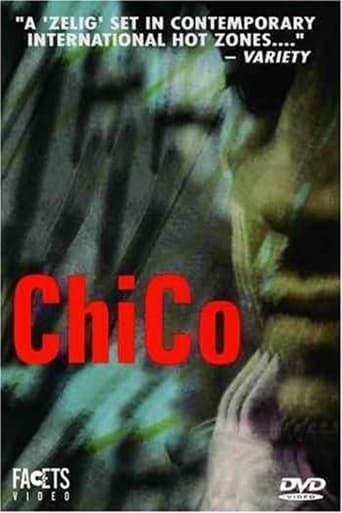

I would call Ibolya Fekete's "Chico" a comparison and contrast of intervention in the US and USSR spheres of influence. The protagonist comes from a Chilean intellectual family that idolizes all things socialist, but the family's flight to Hungary following the 1973 coup in Chile lets them see the Soviet domination of Eastern Europe. The peoples of Eastern Europe soon throw off the chains of Soviet domination and look to the US as a beacon of freedom, but the protagonist still remembers the US intervention in his native country. The moral gray area becomes apparent with the Yugoslav Wars of the 1990s.The movie doesn't moralize, instead simply letting the viewer form his/her own opinion about the sequence of events. It's hard to truly take sides when one sees the raids on people's homes in Chile, and later the bullet-riddled buildings in the former Yugoslavia. I recommend the movie.
... View MoreThe main reason I like Chico by Hungarian director Ibolya Fekete is that it never tries to force you to make a moral decision, to view world in black and white only. It's almost opposite to The Hurt Locker (which I honestly dislike) on that matter. Ibolya Fekete narrate her story, allowing movie watcher to determine who is write and who is wrong. And this is not an easy decision... it's not like a primitive story about straight and heroic American soldiers (Hurt Locker).Also, people in 'Chico' knows what they are fighting for. They may be wrong and they are cruel, but the are not like Americans brought to Iraq by obscure political reasons of W.W...The more you see 'Chico' the more you start to empathize to its main hero... and you're becoming devastated together with him.I suspect, though, that it would be harder to understand this movie for people who were not born in USSR or other communist country, who didn't hear their propaganda for years.
... View MoreI'm not sure a more challenging film has been made. Fekete, director of Bolshe Vita, itself a complex and difficult undertaking, went beyond what we think of as manageable material with Chico. Blurring fact and fiction, uniting a story told through 25 years in 5 nations, or almost-nations, or nations in the process of becoming, unified by the improbable story of an impossible man whose credibility lies in the fact that he is portraying himself, masterfully, honestly, fragmentarily. This is a film of genius by a filmmaker who is not satisfied unless she is on the trail of something very large, very real -- the only other filmmakers I can think of that approach this are the early Rossellini and the early Cassavetes. I would welcome further information on this director and how she managed to make this film.
... View MoreCHICO, a two hour film that is a mixture of documentary footage, biographical exploration of an amazing young man who just happens to be the actor portraying himself, and historical drama creating a film that is as confusing, contradictory, explicitly powerful and ugly as the wars it traverses. Given the fact that the film is shot in multiple locations and in many languages (Spanish, English, Hungarian, Croatian, German, and more), it is extremely demanding of the viewer: not one minute of concentration can be spared to attain the impact of the message writer/director Ibolya Fekete spreads before us.Chico (Eduardo Rózsa Flores on whose life this film is based and who stuns with his acting skills) begins the film as a young boy living in Chile, the son of a Bolivian Catholic mother and a Hungarian Jewish father, and is caught up in the revolutions of the 1960s very much under the influence of Che Guevara's teachings. He family is Communist but Catholic (!), forced to flee Pinochet's Chile and the turnover with Allende, and though not speaking any language but Spanish, Chico goes to Europe as a young man whose goal is journalism but whose convictions embrace revolution as the means to alter the future. In his confusing role of journalist/freedom fighter he becomes intimately involved with the revolutions in Hungary, Albania, Israel, Croatia and the Balkan War with the Yugoslavian decimation of the 1990s.Throughout his travels from revolution to revolution, first as a reporter, but always ending up as a freedom fighter, we meet a huge cast of characters, a cast representing both sides of each revolution, and the lines between identities become blurred to the extent that it is impossible to identify the two sides at odds. It is here that Fekete makes his strongest statement: war is atrocious, cruel, meaningless, destructive, brutal and foolish. Chico sees it all yet continues to actively participate in the killing and the mayhem, all the while feeling the pull of his Catholicism and even his Jewish heritage bifurcating his emotional commitment.The huge cast passes in front of our eyes so quickly that few are present long enough to evaluate as actors. One exception stands out: Richie Varga plays Jimmie, a American from Chicago who steps into the final battle of the film and leaves an indelible impression with his good looks and his sensitive portrayal of a soul searching for meaning in the mess of war. Easily the star of the film is the Chico of Eduardo Rózsa Flores, a man who made it through all the changes and chances of the story and maintains the ability to transmit his puzzling life to us in a verismo manner. This is a film that is very difficult to follow, just as are the various revolutions and wars in countries that are forever changing boundaries and names. But in the end it teaches us a lot about the concept of 'why revolution' and even more about the absurdity of war. Burningly alive cinema, this film is recommended for those who need to understand our global condition from the 1960s to the present. Grady Harp
... View More